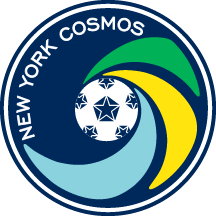News
Thirty-Five Years Ago: The Showdown of Champions

Thirty-five years ago this week, Cosmos Country was host to “The Showdown of Champions,” a match between the Champions of North America and the Champions of Europe, when the Cosmos hosted Hamburger SV on a humid Wednesday night in front of 30,720 at Giants Stadium on June 15, 1983.
The defending NASL Champion Cosmos had just won the Trans-Atlantic Challenge Cup earlier that month. Hamburg had just wrapped up their second consecutive Bundesliga title on June 4. With just two domestic league losses on the season, Hamburg also won the European Cup (a competition now known as the Champions League) that May 25 in Athens with a 1-0 win over Juventus, to make 1983 the most successful in the fabled German club’s history.
The visitors were especially familiar to Franz Beckenbauer, playing in the sweeper role that night for the Cosmos. Having left New York after winning the 1980 NASL title, Beckenbauer joined Hamburg for two seasons, returning to the Cosmos after winning the Bundesliga with Hamburg in 1982.
Hamburg started out strong, with Danish forward Allan Hansen opening the scoring in the 13th minute. [roughly 6:30 of the video) The European champions dominated the first twenty-minutes, legendary referee and long-time Westchester County resident Gino D’Ippolito blowing his whistle repeatedly to call the Cosmos offside.
Then the Cosmos started to figure out Hamburg’s trap. With just under a half hour played, Steve Moyers dribbled down the left, then played a deep pass to Rick Davis, who cut back to Roberto Cabañas, who one-timed the ball with his left past Hamburg 'keeper Uli Stein [14:20 mark]. But less than two minutes later, Jimmy Hartwig headed in from just four-yards out to reclaim the lead.
If the European champions were the superior side for much of the first half, it was another story after intermission, as the Cosmos took complete control. In the 55th minute, Davis stole the ball in midfield with a poke to Cabañas, who played the ball out left to Julio Cesar Romero, who played the ball on to Davis, racing down to the left, who then cut back a perfect pass to Chinaglia [24:00] to bring it level.
Ten minutes later, the Cosmos took the lead when Dutch master Johan Neeskens scored with assists from Bogićević to Cabañas to Moyers. [31:00] In the 78th minute, Moyers played in Wim Rijsbergen, who was fouled for a penalty. Chinaglia made no mistake about it, beginning his run to the twelve-yard spot with a ten-yard sprint from the top of the box, sending Stein the wrong way before slotting it home to his left to take the 4-2 lead. [34:40]
On a night full of highlights, the play of the match came in the 80th minute, when Davis received a Bogićević cross twenty-five yards out. Receiving the ball hip-height, the American cut left to beat one defender, then cut right to find himself 1-v-1 with Stein before slotting the ball home. [35:00]
Roughly five-minutes later, Cabañas danced his way through five defenders with assists from Rijsbergen and Daryll Gee to score his second of the night [38:00]
The final icing on the cake came in the 88th minute. With the Cosmos still pressing for more, Cabañas stoke the ball from Jimmy Hartwig on the touchline, then crossed over to Bogićević for an easy, well-deserved tap-in [40:00]. Bogi picked the ball from the net, kissed it, then held it aloft for the Meadowlands faithful in a triumphant gesture.
The Cosmos’ second-half performance was arguably the greatest any Cosmos team ever played.
Ten of the twelve players to play that night for Hamburg would start in the Intercontinental Cup Final against Gremio later that December (a 2-1 extra-time loss for the Germans). The Cosmos had beaten Gremio, 3-1, in 1981. With CONCACAF teams denied a spot in the Intercontinental Cup, for the defending North American and Trans-Atlantic Challenge Cup Champions to claim a territorial right to compete for the title of world’s champion that night was reasonable, given competitions at the time.
Since the Bundesliga began in 1963 – five years before the original NASL – the only club to avoid relegation had been Hamburg, until last month. The Hamburg team that lost to the Cosmos that night was the best in their history, and they brought out the best in the Cosmos. Humidity and AstroTurf could not excuse a five-goal beating. Clearly, the Cosmos were, on the night, the best team in the world.


